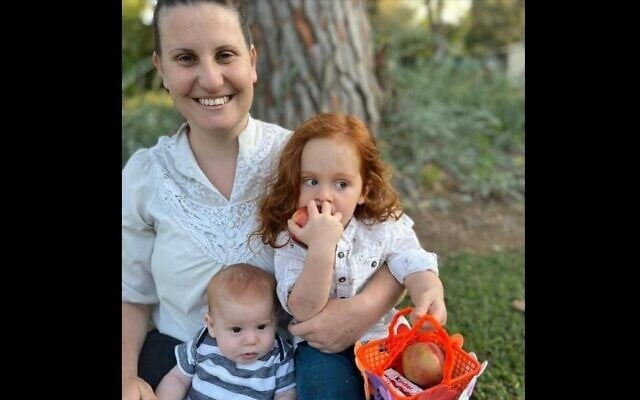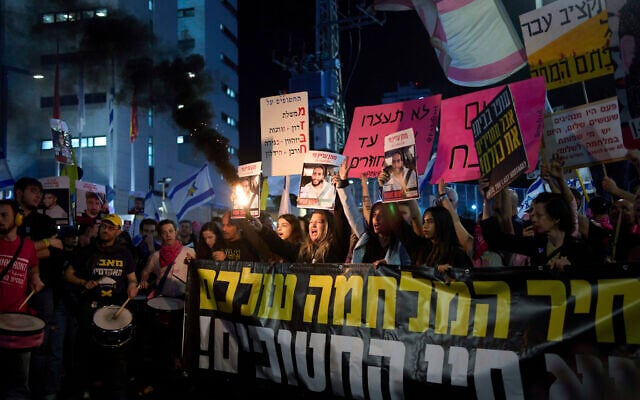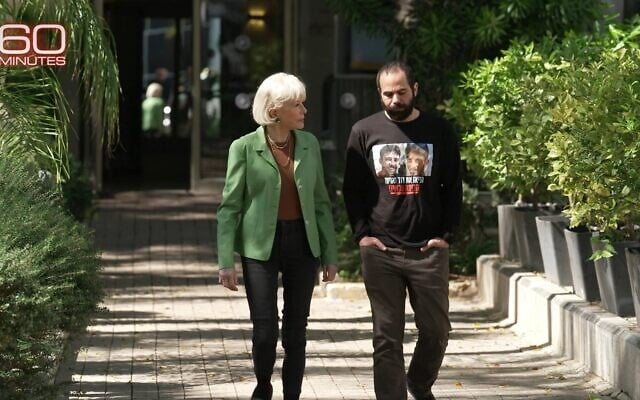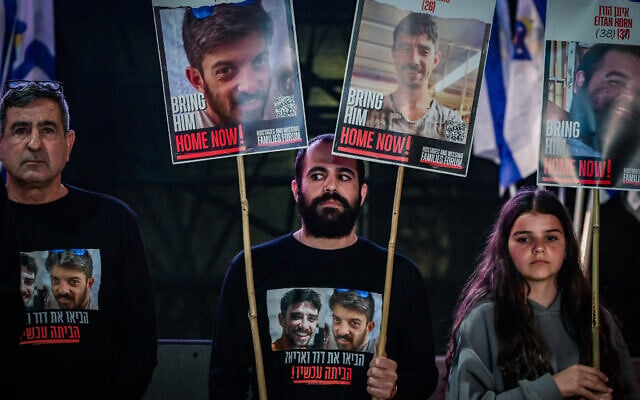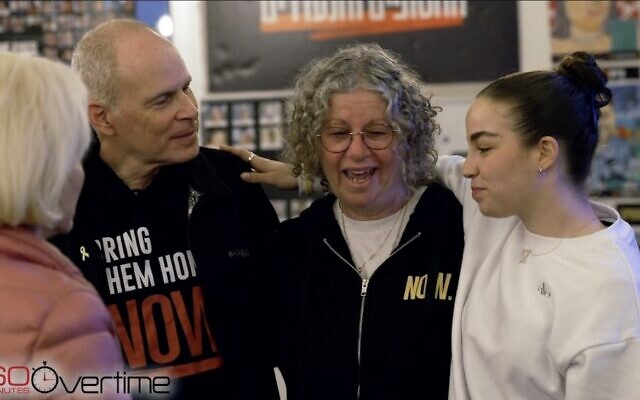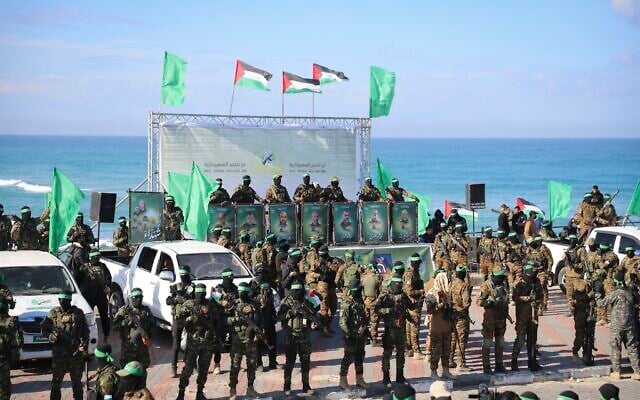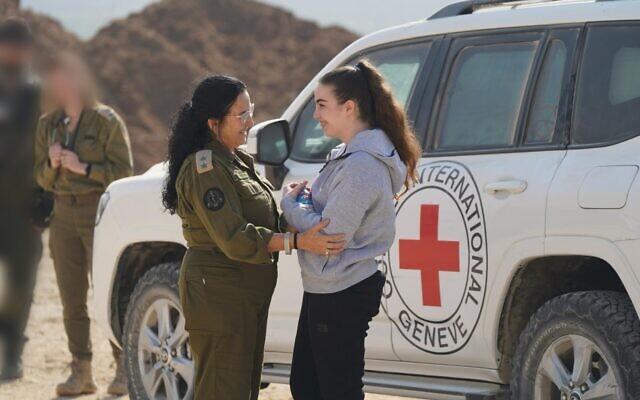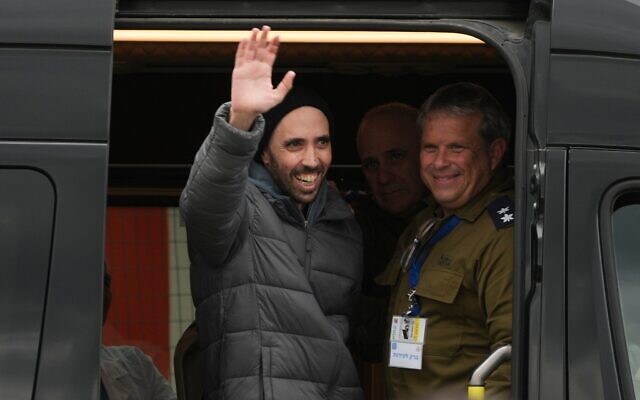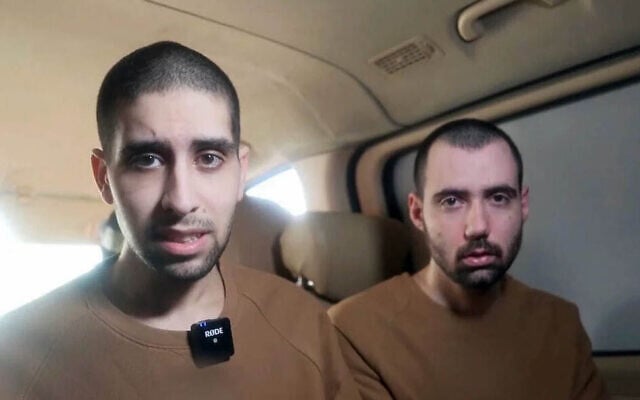


Yarden Bibas to 60 Minutes: Only Trump can convince Netanyahu, Hamas to renew ceasefire-hostage deal
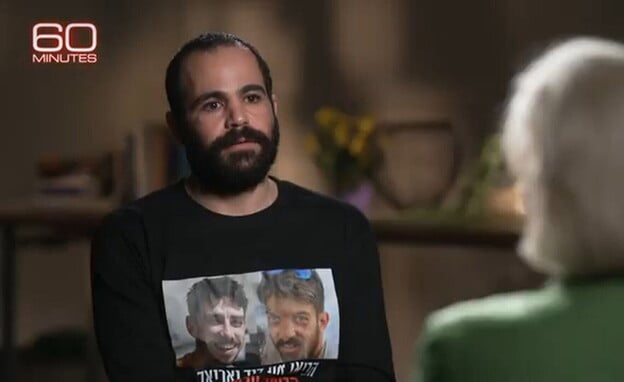
Five former hostages held in the Gaza Strip have given harrowing testimony of their captivity, while stressing the need to secure the release of those still in Hamas’s hands, with one of them, Yarden Bibas, appealing to US President Donald Trump as the only person he believes can make that happen.
CBS’s “60 Minutes” on Sunday aired an interview with Bibas, the first the bereaved father and husband has given since his release from Hamas captivity earlier this year and the return of his murdered wife and two young children.
Released hostages Keith and Aviva Siegel and Agam Berger, who were held together in a Hamas tunnel, were also interviewed in a reunion. They spoke of the psychological burden they endured in captivity, being forced to witness the sexual assault of female hostages, starvation and how they helped each other keep up their spirits.
Another former hostage, Tal Shoham, spoke to the network along with the parents of hostages Guy Gilboa-Dalal and Evyatar David, who were held with him. Shoham said conditions were so bad that it led the other two to discuss suicide as a way of ending their suffering.
Their testimonies aligned with those of other hostages who have described the abuse they suffered at the hands of terrorists. The hostages were abducted on October 7, 2023, when the Hamas terror group led a devastating invasion of southern Israel, killing 1,200 people, mostly civilians, and abducting 251 hostages to the Gaza Strip.
Bibas called on Trump to stop the resulting war in Gaza and bring back the hostages still in captivity.
Asked by 60 Minutes if he has a message for the US president, Bibas responded, “Please stop this war and help bring all of the hostages back.”
Pressed on whether he really believes Trump can help, Bibas replied, “I know he can help. I’m here because of Trump. I’m here only because of him.”
“He has to convince Netanyahu, he has to convince Hamas. I think he can do it,” he said, indicating that both the Israeli premier and the terror group need to be pressured.
Bibas’s remarks appeared to reflect the feeling of many of the hostage families who have focused their efforts to release their loved ones on the administration in Washington, believing that Prime Minister Benjamin Netanyahu’s government won’t enter a deal without significant pressure from the administration in Washington.
Negotiations for a ceasefire, mediated by the US, Egypt and Qatar, had continued for over six months without a deal until Trump warned there would be “hell to pay” if hostages weren’t released by the time he was sworn in for his second term. The threat appeared to prod both sides into reaching an agreement in January that Trump has taken credit for, though most of the details were laid down by the previous administration.
Bibas’s response also highlighted hostage families’ opposition to Netanyahu’s decision to resume the war earlier this month amid an impasse in negotiations with Hamas on continuing the ceasefire that brought about the release of dozens of hostages, among them Bibas and the remains of his murdered family. They have expressed fear that the resumed Israeli strikes endanger the remaining hostages. Roughly 24 of the 59 captives still in Gaza are believed to still be alive.
Netanyahu broke with the wishes of most of the hostages’ families — and much of the public–— by ordering a resumption of attacks in Gaza on March 18.
Asked whether Netanyahu’s declared strategy of military pressure would lead the terror group to ease its demands, Bibas responded emphatically: “No. No.”
Describing the hostages’ captivity conditions while the war is ongoing, Bibas said, “It’s scary. You don’t know when [Israeli strikes will occur]. And when it happens, you’re afraid for your life.”
“The whole earth would move — like an earthquake, but [I was] underground, so everything could collapse at any moment,” he said.
Speaking of the murder of his wife, Shiri, four-year-old son Ariel, and nine-month-old son Kfir, Yarden said, “They were murdered in cold blood — bare hands.”
He said his Hamas captors used to tell him, “‘Oh, it doesn’t matter. You get a new wife, new kids. Better wife, better kids.’ They said that many times.”
According to assessments by Israeli officials, Bibas’s wife was “brutally” murdered along with her two boys in November 2023. The three were buried last month.
Bibas conducted the interview while wearing a t-shirt with the pictures of hostage brothers David and Ariel Cunio, his friends and neighbors in Kibbutz Nir Oz, which was one of the border towns hit hardest during the October 7 onslaught.
“They’re both still in captivity, and I don’t know if they have enough food, enough water, especially now when the war is back on,” Bibas said.
“We did everything together,” he said of himself and David Cunio. “He was with me in every big thing in my life. He was in my wedding.”
“Now I’m having probably the hardest thing… [in] my life, and David is not with me,” Bibas lamented.
“I lost my wife and kids. Sharon [Cunio] must not lose her husband,” he said.
In his remarks, Keith Siegel said that he was forced to witness the sexual assault of female hostages by their Hamas captors.
“I witnessed a young woman who was being tortured by the terrorist. I mean literal torture — not just in a figurative sense,” Siegel said.
Siegel, who was released from captivity in February after 484 days, said he was forced to watch the abuse: “I saw sexual assault with female hostages.”
Recalling the day he was kidnapped by Hamas, the 65-year-old dual American-Israeli national said he and his wife Aviva were “driven into Gaza and then taken into a tunnel — feeling in danger, feeling life threatened, terrorists around us with weapons.”
They were held underground in Hamas-dug tunnels, where “we were gasping for our breath.”
He said his treatment worsened significantly after the end of the first brief ceasefire and hostage deal in November 2023, during which his wife was released.
“The terrorists became very mean and very cruel and violent. Much more so. They were beating me and starving me,” Siegel said. “They would often eat in front of me and not offer any food.”
Once a month, the hostages were allowed to shower with a bucket of cold water and a small cup. His captors shaved his head and private parts. “Maybe it amused them… I felt humiliated,” according to Siegel, who said captivity completely broke his spirit.
“I felt that I was completely dependent on the terrorists, that my life relied on them — whether they were going to give me food, bring me water, protect me from the mobs that would lynch me,” Siegel recalled.
“I was left alone several times, and I was very, very scared that maybe they won’t come back and I’ll be left there. And what do I do then?” he recounted. “Maybe that was a way for them to torture me in a psychological way, make me think, ‘Should I escape? Should I not escape? Should I try to escape?’”
“But I’m pretty sure they knew I wouldn’t dare to do that because I needed them,” Siegel said.
He said that since his release, he has spent most of his time worrying about the hostages still in Gaza.
At that point, Siegel broke down, crying bitterly, folding his head into his hands and then onto the table in front of him.
Seigel, his wife Aviva, and fellow released captive Berger were initially held together with four others in a small, cramped tunnel. After Aviva’s release in November 2023, Keith and Berger were separated.
“You couldn’t stand up. [There was] no room to walk around. Only if we needed to use the toilet, we were allowed to get out of this niche,” Seigel recalled.
“The first day they were with us for a few hours, and then they left us. We said, ‘If we need help, what do we do?’ And they said, ‘Come to the stairs and shout for us and we’ll come.’”
Seigel said he was relieved when his wife was released, but later saw how she was mobbed by hostile Gazans during her transfer. “I wasn’t sure Aviva made it home alive… This was very stressful.”
When he was finally released in February, Seigel said he was told by his captors that he needed to wave and thank Hamas during his release ceremony.
“I waved to the audience. I did not say, ‘Thank you,’” he recalled, adding that he had felt anxious that something would go awry at the last minute and that he would not be released.
Discussing the strong bond he formed with the hostages he was held with, Seigel said they all looked after each other physically and emotionally.
Embracing Berger, Aviva Seigel said she kept smiling throughout their captivity and that it gave all of them a great deal of strength. She recalled how she and Berger used to hold hands and look into each other’s eyes to try and mitigate their fear.
Aviva also shared how Berger and fellow hostage Liri Albag cheered Keith up during one particularly dark time of their captivity.
“Most of the time Keith cheered us up,” Berger noted.
“When it was tough for one of us, all the others helped,” Keith said.
“There was a very, very intense bombing. Agam was especially afraid. [I asked her] if it was okay if I were to hold her hand. I held her hand,” he recalled. “She helped me, and I helped her.”
Keith used the interview to call on the Trump administration, the Israeli government and the mediating parties to get back to the negotiation table in order to renew the ceasefire and hostage release deal.
“It’s urgent, and every day that this goes on is just more and more suffering and more and more possible death and psychological devastation,” he said.
Shoham, another released hostage, recalled how Gilboa-Dalal and David — captives with whom he was held and who are still in Hamas custody — openly discussed taking their own lives because of the inhumane conditions under which they were held.
“One of the toughest things that I heard from them — they told me more than once, ‘Why stay alive?’” Shoham told CBS. “Why not just take their own life with their own hands and finish it… to get released from this?”
Shoham was interviewed alongside the parents of Gilboa-Dalal and David.
“They will do it together if they decide to do it,” said David’s mother, Galia.
Shoham, 40, shared how he turned into a father-like figure to the 23-year-old Gilboa-Dalal and David. “They are not children, but from time to time, I felt like a father,” Shoham recalled before choking up.
“They are children,” Gilboa-Dalal’s father Ilan chimed in.
“I really, really fear that they are now alone,” Shoham said.
Gilboa-Dalal and David’s Hamas captors drove them to a hostage release ceremony last month and forced the pair to watch.
“Then they moved them back to the tunnels [to] devastate them,” Gilboa-Dalal’s father said.
CBS’s Lesley Stahl said she doesn’t know how anyone could watch the video that Hamas produced from that day, but David’s mother Galia responded, “It was a sign of life.”
During the joint interview, Shoham shared with the parents details of his captivity with Gilboa-Dalal and David.
“It’s important for us to know exactly what’s going on with our children,” said Gilboa-Dalal’s father.
Shoham spoke of how Gilboa-Dalal cried for five or six days straight after being taken captive. He recalled how they lived in very narrow tunnels and were only given minute amounts of pita bread, rice and water.
“Sometimes the water tastes like blood, sometimes like iron. Sometimes it was so salty that you could not drink it, but you don’t have anything else,” he said.
One of their captors told them that they were being given the bare minimum amount of food to be able to survive for years. “You won’t die, but you will have the worst time,” Shoham recalled being told.
To get additional food, Shoham said he and the other hostages would give back rubs to their captors every day.
“It’s worse than how they treat animals,” Gilboa-Dalal’s father said.
Asked how she could listen to such agonizing details, David’s mother responded, “I want everyone to listen because this is the reality. Maybe someone will hear it, and it will save our sons.”

